 |
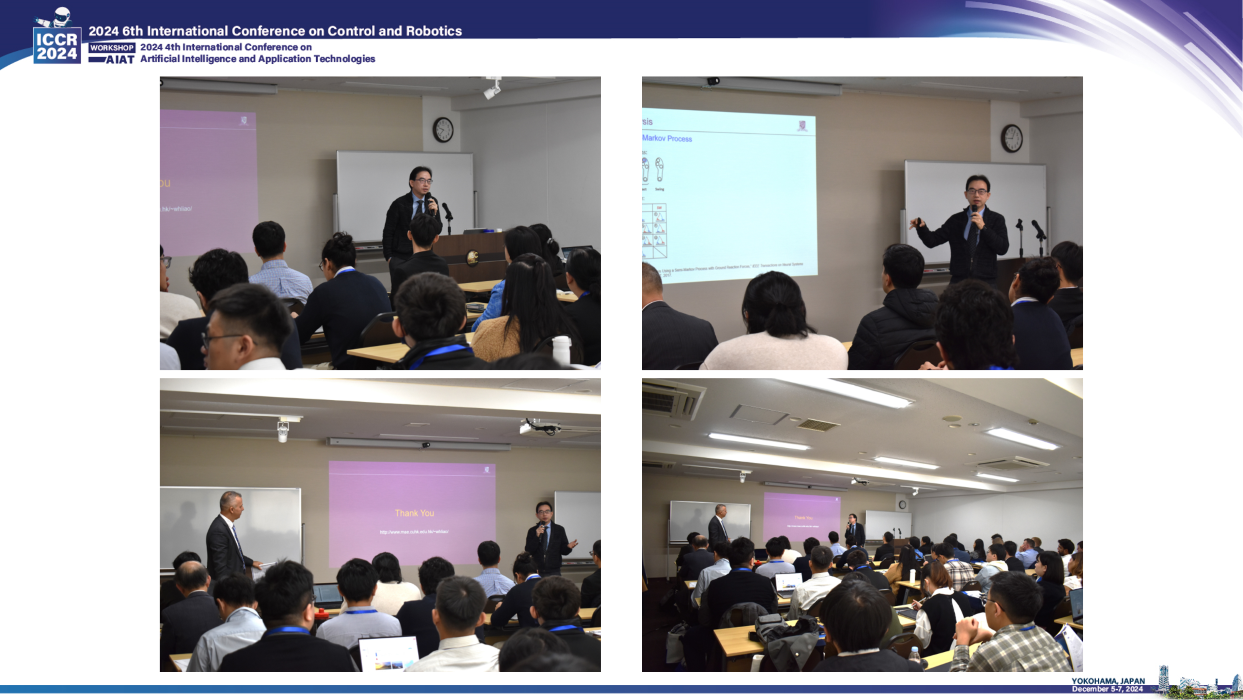 |
|||
| Conference General Chair Prof. Genci Capi, Hosei University, Japan |
Keynote Speaker: Prof. Wei-Hsin Liao The Chinese University of Hong Kong |
|||
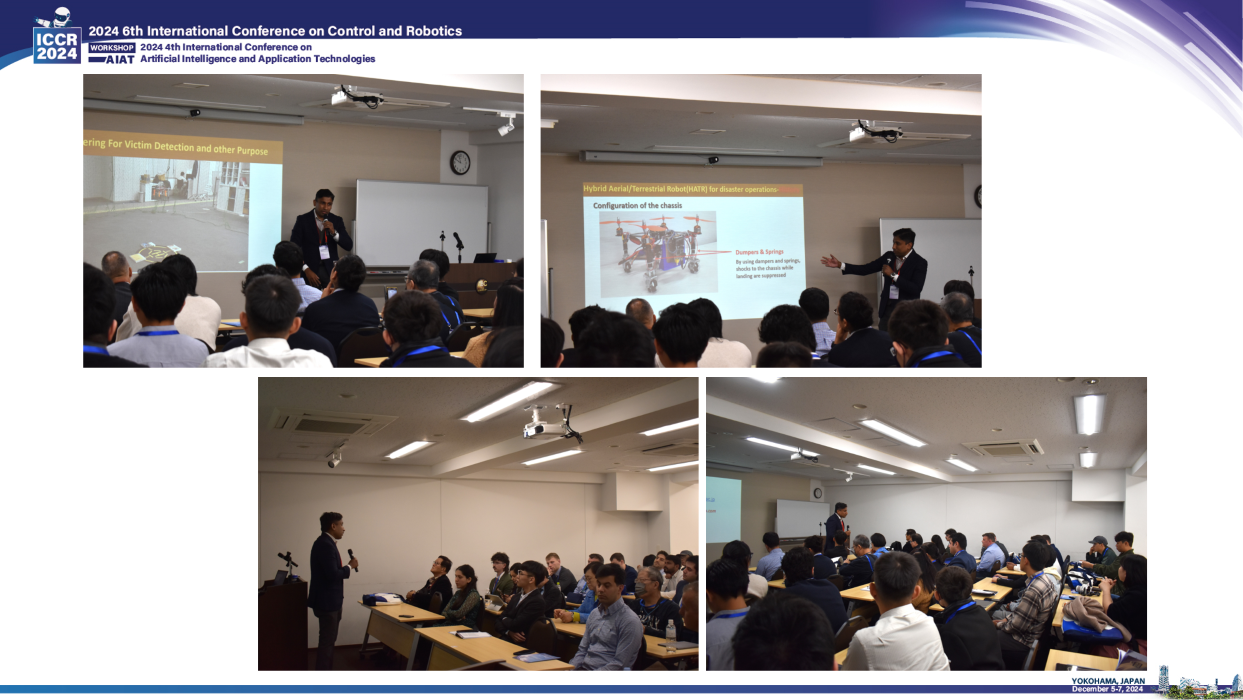 |
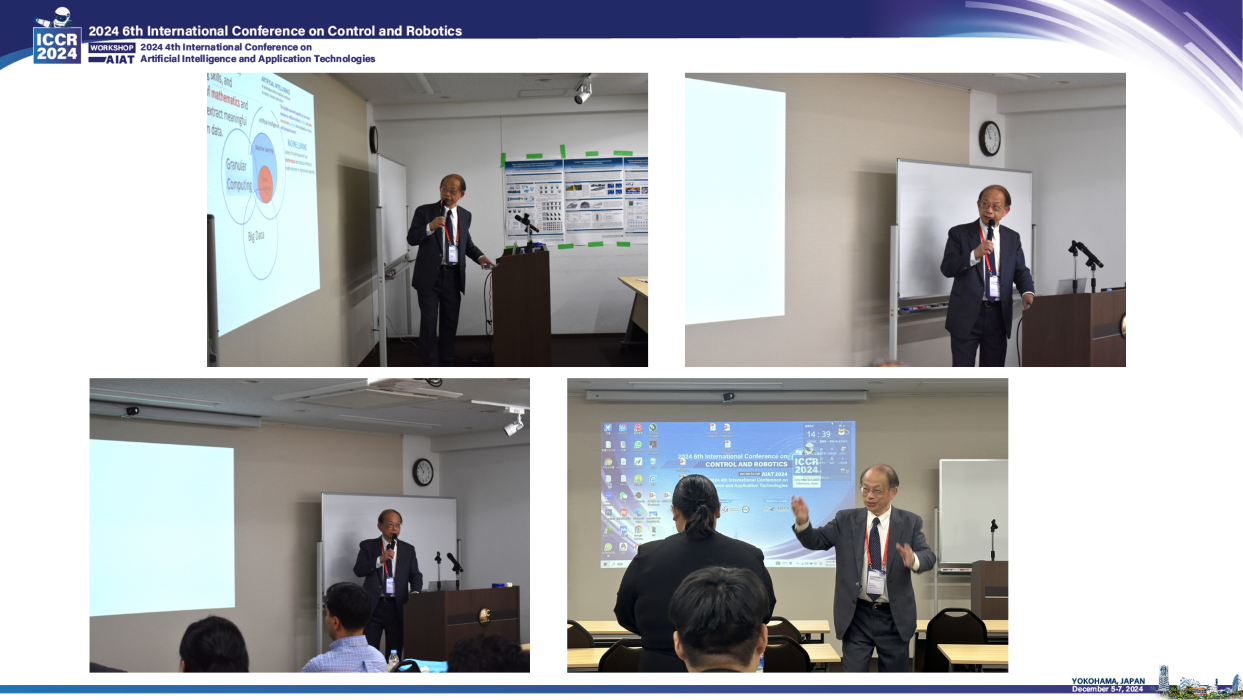 |
|||
| Keynote Speaker: Prof. Chinthaka Premachandra Shibaura Institute of Technology, Tokyo, Japan |
Keynote Speaker: En-Bing Lin Wentworth Institute of Technology, USA |
|||
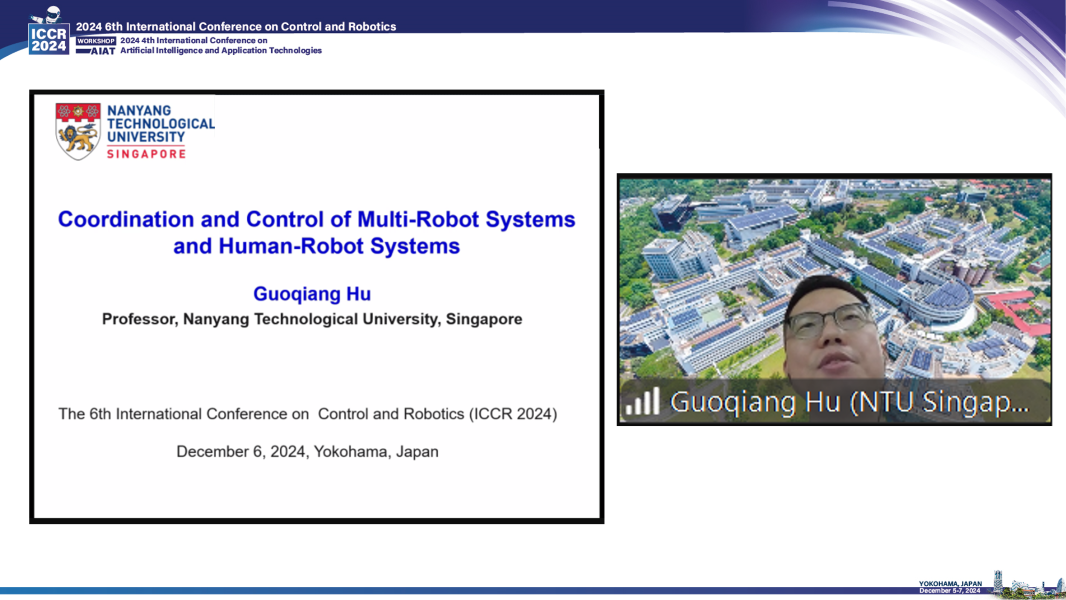 |
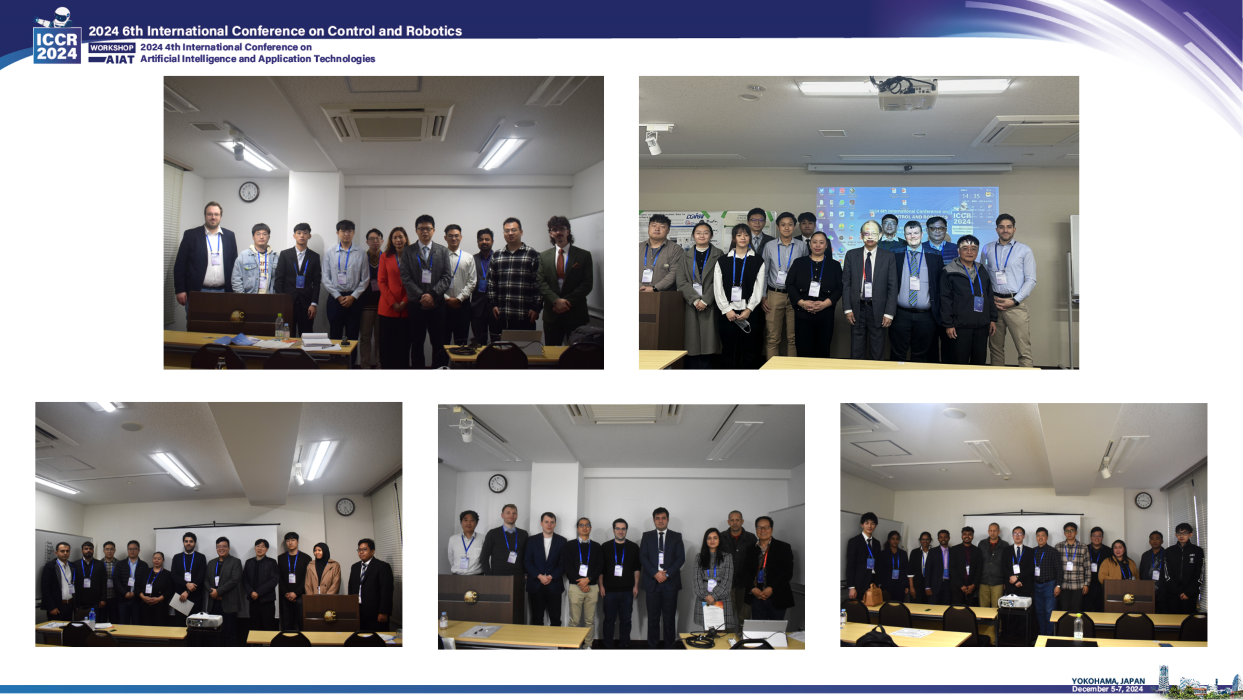 |
|||
| Keynote Speaker: Guoqiang Hu Nanyang Technological University, Singapore |
Onsite Sessions |
|||
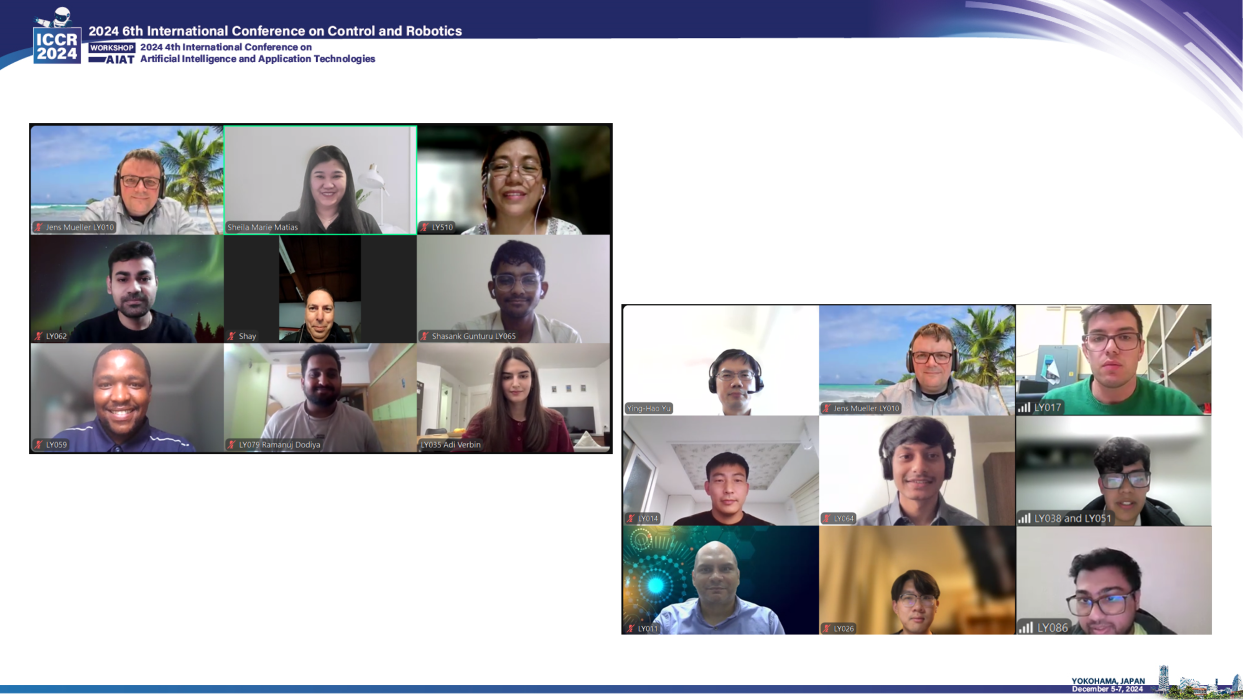 |
 |
|||
| Online Sessions | Authors' Presentation |
 |
2024 6th International Conference on Control and Robot (ICCR 2024) ICCR 2024 conference proceedings has been archived inot IEEE Xplore already. Read More ICCR 2024 conference proceedings has been indexed by Ei Compendex and Scopus. |
Onsite Session 1: LY010 & LY506
Title: Swarm Flight Unit (SFU)
Author(s): Jens Mueller, Joachim Horn, Kevin Larkin, Marie Schweim and Anne Schweim
Presenter: Jens Mueller, Helmut Schmidt University, Germany
&
Title: App-solutely Engaging: Transforming the Tourist Experience with Interactive Technology
Author(s): Tenie P. Lirazan, Jocelyn P. Perez, Jefferson Costales, Maria Rhoda D. Dinaga
Presenter: Tenie P. Lirazan, Eulogio "Amang" Rodriguez Institute of Science and Technology, Philppines
Onsite Session 2:
LY029-A
Title: Physics-based Multi-beam Sonar Simulation for Maritime Robotics Simulations in ROS-Gazebo Framework
Author(s): Woen-Sug Choi, Tae-Yeon Kim, Woo-Sung Lee and Ji-Wan Ha
Presenter: Woen-Sug Choi, Korea Maritime and Ocean University, South Korea
Onsite Session 3: LY016
Title: Data-Driven MPC for Collision-Free Robot Manipulation: An Online Deep Reinforcement Learning Approach
Author(s): Adel Baselizadeh, Weria Khaksar and Jim Torresen
Presenter: Adel Baselizadeh, University of Oslo, Norway
Onsite Session 4:
LY028
Title: A Comparative Study between Model Predictive Control and Reinforcement Learning for Robust Reference Tracking in Chemical Processes
Author(s): Seyedhamidreza Toliati, Omid Sobhani, Furkan Elmaz, Benedict Carius, Johan Van den Hauwe, Ali Anwar and Siegfried Mercelis
Presenter: Seyedhamidreza Toliati, University of Antwerp - imec Antwerp, Belgium
Onsite Session 5:
LY505
Title: Guidance on Dataspaces: Development of an Learning Environment
Author(s): Jonas Lick, Jessica Lamarz, Friederike Dohmann, Pranav Jayant Kulkarni, Julian Zerbin, Christian Koldewey
Presenter: Jonas Lick, Fraunhofer IEM, Deutschland
Online Session 1:
LY014
Title: Design and Characterization of the Torsion Spring-Motor Integrated Series Elastic Actuator
Author(s): Joonyoung Jang, Zachary Hooker, Tao-Yi Wan, Pablo Tejeda and Thomas Bewley
Presenter: Joonyoung Jang, University of California, United States
Online Session 2:
LY035
Title: Category-Level Object Size Estimation from a Single RGB Image
Author(s): Shay Horovitz and Adi Verbin
Presenter: Adi Verbin, College of Management, Israel
 |
Wei-Hsin Liao, the Chinese University of Hong KongBiography: Wei-Hsin Liao received his Ph.D. in Mechanical Engineering from The Pennsylvania State University, University Park, USA. Since August 1997, Dr. Liao has been with The Chinese University of Hong Kong, where he is Choh-Ming Li Professor of Mechanical and Automation Engineering. His research has led to publications of over 400 technical papers in international journals and conference proceedings, 27 patents. He was the Conference Chair for the 20th International Conference on Adaptive Structures and Technologies in 2009; the Active and Passive Smart Structures and Integrated Systems, SPIE Smart Structures/NDE in 2014 and 2015. He received the T A Stewart-Dyer/F H Trevithick Prize 2005, the ASME 2017 Best Paper Award in Mechanics and Material Systems, the ASME 2021 Energy Harvesting Best Paper Award, and the ASME 2023 Best Paper Award in Structural Dynamics and Control. He is the recipient of the 2020 ASME Adaptive Structures and Material Systems Award and the 2018 SPIE Smart Structures and Materials Lifetime Achievement Award. He is also the recipient of 2023 ASME Leonardo Da Vinci Award for the eminent achievement in the design and invention. Dr. Liao currently serves as an Associate Editor for Journal of Intelligent Material Systems and Structures, and on the Executive Editorial Board of Smart Materials and Structures. Dr. Liao is a Fellow of ASME, HKIE, and IOP. Speech Title: Control of Robotic Exoskeletons for Motion Assistance Abstract: Exoskeletons are promising devices for motion assistance of mobility impaired patients and motor ability augmentation of healthy people. Considering the interactive action between exoskeletons and human body, a safe and comfortable human-exoskeleton interaction is essential to achieve effective exoskeleton operations for human motion assistance. We developed a novel cable-driven series elastic actuation (CSEA) system to realize a flexible and portable back-support exoskeleton design with safe, efficient, and sufficient assistive torque output capability. Meanwhile, this mechanism enables the CSEA system to integrate series elastic actuator (SEA) with cable transmission and operates with multiple statuses to leverage SEA advantages and to overcome its torque output limitation. A unified torque controller is designed for stable, continuous, and accurate torque control of the CSEA system despite its discontinuous dynamics during operation status transition. The efficacy of the closed-loop CSEA system to enable an ergonomic and efficient back-support exoskeleton actuation with the capability of accurately delivering desired level of assistance is verified via bench tests and human tests. Results verified that the CSEA system actuated exoskeleton can effectively reduce activity of relevant muscles during trunk flexion and extension motions compared to no exoskeleton case, validating successful application of the CSEA system on the exoskeleton for an effective back support effect. In this talk, the developed devices/systems and key results will be presented.
|
|
 |
Chinthaka Premachandra, Shibaura Institute of Technology, Tokyo, JapanBiography: Chinthaka Premachandra was born in Sri Lanka. He received the B.Sc. and M.Sc. degrees from Mie University, Tsu, Japan, in 2006 and 2008, respectively, and the Ph.D. degree from Nagoya University, Nagoya, Japan, in 2011. From 2012 to 2015, he was an Assistant Professor with the Department of Electrical Engineering, Faculty of Engineering, Tokyo University of Science, Tokyo, Japan. From 2016 to 2017, he was an Assistant Professor with the Department of Electronic Engineering, School of Engineering, Shibaura Institute of Technology, Tokyo, where he was an Associate Professor, from 2018 to 2022. In 2022, he was promoted to a Professor with the Department of Advance Electronic Engineering, School of Engineering and Graduate School of Engineering, Shibaura Institute of Technology, where he is currently the Director of the Image Processing and Robotic Laboratory. His research interests include AI, UAV, image processing, audio processing, intelligent transport systems (ITS), and mobile robotics. Talk Title: Hardware and Software Developments for UAV Applications in Disaster Site Operations
|
|
 |
Guoqiang Hu, Nanyang Technological University, SingaporeBiography: Dr. Guoqiang Hu is currently a Professor of Intelligent Systems and Robotics in the School of Electrical and Electronic Engineering at Nanyang Technological University, Singapore. He received Ph.D. in Mechanical Engineering from University of Florida. His research interests include optimization and control, game theory, and learning algorithms, with applications to robotics and smart city systems. He was a recipient of several awards, including the Best Paper in Automation Award in the 14th IEEE International Conference on Information and Automation, the Best Paper Award in the 36th Chinese Control Conference, and the Best Paper Award in the 4th Asia Pacific Conference of the Prognostics and Health Management Society. He currently serves as Associate Editor for IEEE Transactions on Control Systems Technology and IEEE Transactions on Automatic Control. Talk title: Coordination and Control of Multi-Robot Systems and Human-Robot Systems |
Copyright © The 8th International Conference on Control and Robotics |ICCR » iccr_conf@robotics.ac.cn